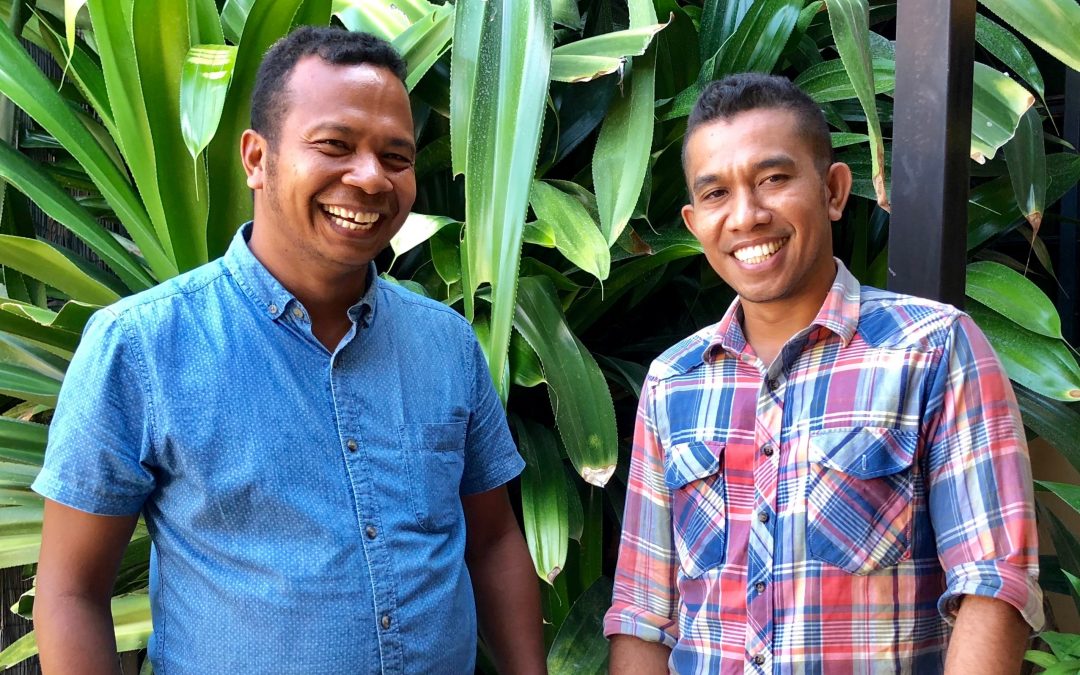“Culture and family are really important in Timor-Leste” explains Francisco Guterres Dos Reis. “One special tradition is when a family decides to build a house. All the families from the grandfather and the grandmother come to help. This is a celebration of our roots, and of all the family who will come from this house in the future. This happened for me when I built my traditional house”
It seems fitting in a culture where building a home is such a potent symbol of putting down strong roots, that Francisco has found his niche upskilling Timor-Leste’s engineering sector, as a Program Coordinator with the EWB Professional Skills Development (PSD) Program.
Having gained independence in 2002 after years of conflict, Timor-Leste has set down a clear development agenda through its Strategic Development Plan 2011-2030. However, the country is working to overcome some tough challenges. Currently four in ten Timorese live below the national poverty line, three in ten people still lack clean water and over half the population has no access to a toilet. The private sector faces difficulties including a low-skilled workforce and poor infrastructure. Women also face significant barriers in accessing education and employment. (Source: WaterAid, DFAT)
EWB’s locally-led Education and Professional Skills Development (PSD) program enables Timorese engineering/technical students and professionals to access skills training and practical work experience where such opportunities are hard to find. In turn this is an important way to address skills shortfalls and reinforce the sector to meet Timor-Leste’s housing, energy, and sanitation infrastructure needs.
The program, which to date has enabled access to industry relevant training for over 600 students and technical professionals in Cambodia and Timor-Leste, addresses specialised skills gaps such as engineering for sanitation in challenging environments. Tackling gender barriers to improve the representation of women in the industry is also an important point of difference for the program, which facilitates the Women in Engineering Group, known locally as Feto Enjiñeira (see right).
Francisco himself has worked hard to adapt his skills to the opportunities and development needs in his country, and was awarded a scholarship from EWB Australia to study a Bachelor of Civil Engineering in Timor-Leste, though he originally qualified in IT. “I decided to apply to study a Bachelor of Civil Engineering because our country needs development and needs those skills. Communities live in poor housing conditions, and lack access to toilets, and clean water. If I study civil engineering, I can practise it and use that knowledge. It is important that I am a Timorese role model.”
Francisco is now combining his engineering studies with his EWB role, and has a unique insight into the challenges facing engineers trying to break into and advance in the sector. “Based on my experience it is difficult for recent graduates to get a proper job,” He says “Students do not have good work experience, and that makes it hard to get a job.”
The PSD program works in a number of ways. Engineering Design Challenges promote peer-to-peer student learning, and to encourage female representation each participating team must include women. In the past 12 months 60 students across 4 universities took part, resulting in 10 submissions of practical, detailed designs that can improve community life. According to Francisco, the students really embrace this approach. “The students are all really enthusiastic about the program. We teach Human Centred Design and they all say this is really something new for us. The students really, really love it, and say this will be really helpful not just for us, but for students of engineering in the coming years.”
Working with CNEFP, the National Centre for Employment and Professional Training in Timor-Leste, the program team designed and developed a Leadership in Project Management course specific to the Timorese context. The course will be delivered by CNEFP trainers, addressing a sector skills gap and providing a new revenue stream for the centre.
The program also facilitates industry relevant internships that provide on-the-job experience. “Some students are really shy when they start but we train them how to work with partners,” Says Francisco “Many do project management and technical work. They are always excited to share their learnings with the other students.” Over the period July 2016 to July 2017, PSD supported 12 internships with organisations including WaterAid and Plan International, and four out of four recent graduates who had completed internships secured full time professional employment – a testament to the advantages of this work experience given the limited employment market.
Additionally the PSD Mentoring Program pairs students to professional mentors in Timor and Australia so they can gain expert guidance, with 25+ matches already made. “In my country the mentoring program is something new. Professional mentors can open the students’ minds, and help them with their plans.”
So what do employers think of the program? “Based on our experience they think highly of it.” Says Francisco “One of our students gave me feedback saying that because of the internship program he now has a job with the government as a quality control officer. He was able to talk about his internship, and they were impressed. That made me feel happy – this program really has an impact and that’s what I want to do!”
Moreover PSD fosters entrepreneurship by facilitating young engineers to create their own opportunities in the local market. Vitorino Soares a graduate who finished a PSD internship in March 2017, went on to set up his own horticulture enterprise with a view to employing young out-of-work Timorese. Opening up fresh perspectives through the PSD program is building new career pathways in the sector.
EWB employs four national staff like Francisco, and works with more than 10 local community partners in Cambodia, Timor-Leste and Vanuatu; strengthening the national engineering sector and nurturing a new generation of talent who can lead locally relevant initiatives for their peers in the industry. Francisco smiles, “I believe that with this approach that the community are really going to love having us here!”


